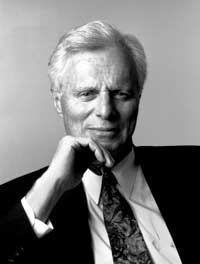Philip Wyatt
Biography

Photo: ©PeteBleyer.com
Philip J. Wyatt is the Founder and Chief Executive Officer of Wyatt Technology Corporation. He is the American Physical Society’s 2009 recipient of the Prize for Industrial Applications of Physics with the citation: "For pioneering developments in the physics of the inverse scattering problem: new applications of laser light scattering and the successful sustained commercialization of new related analytical methods and instrumentation." He is the Chair of the American Physical Society's largest unit, the Forum on Industrial and Applied Physics.
Wyatt received his undergraduate education in liberal arts, physics and mathematics at the University of Chicago, and Christ's College, Cambridge. His graduate education was completed at the University of Illinois (M.S.) and the Florida State University (Ph.D.). The author of more than fifty articles, Dr. Wyatt has co-authored or contributed to eleven books, and was nominated by the NAS as one of fifteen finalists for this country's first Scientist-Astronaut Selection Program. He is a Fellow of the American Association for the Advancement of Science, The American Physical Society, and the Optical Society of America, and has had over thirty foreign and domestic patents issued relating to laser light scattering and other technologies. In 2003, he was named Graduate of Distinction by the College of Arts and Sciences at FSU. He is a Registered Agent before the U. S. Patent and Trademark Office.
Statement
I have been an industrial physicist for most of my professional career. I would hope that my membership on the FIAP Executive Committee as a Member-at-large would provide me a vehicle to encourage both the Society and future generations of newly graduating physicists to search out the many new types of employment opportunities that need their skills in industry. The Country’s future as a great nation depends now more critically than at any former time in its history on the abilities of its citizens to innovate, develop new technologies, and create new industries. As always, physicists will play a key role in achieving these objectives, but far more are needed to transform such objectives to reality.
